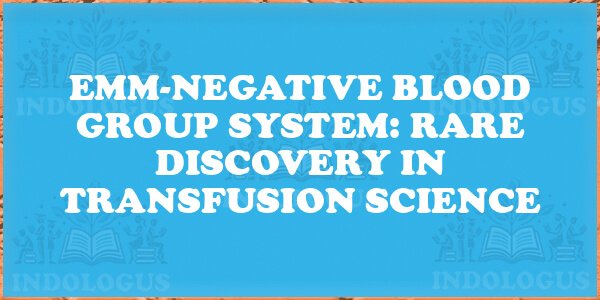The EMM-negative blood group system, also known as Gwada negative, is a newly recognized blood type with significant implications in transfusion medicine. This system emerged from the unique case of a woman from Guadeloupe, making her the only known individual with this rare blood type. The discovery highlights the importance of advancements in genetic research and transfusion practices.
What is Gwada Negative?
- Gwada negative refers to the absence of the EMM antigen on red blood cells.
- The EMM antigen is a high-incidence antigen found in most individuals.
- This rare blood type is classified as the 48th globally recognized system in transfusion science.
Discovery Process
- In 2011, the woman from Guadeloupe was identified with the EMM-negative blood type during routine blood tests.
- Advancements in high-throughput DNA sequencing in 2019 enabled researchers to confirm the unique genetic mutation responsible for the absence of the EMM antigen.
- The International Society of Blood Transfusion (ISBT) officially recognized the discovery in 2025.
Rarity and Clinical Implications
- The woman from Guadeloupe is currently the sole carrier of the Gwada negative blood type.
- With a dual inheritance of the rare gene variant from both parents, she completely lacks the EMM antigen.
- Clinically, she can only receive blood from herself to avoid severe immune reactions triggered by transfusions from donors with the EMM antigen.
Importance in Transfusion Medicine
- The discovery of the Gwada negative blood type is crucial for safe transfusions.
- Recognition of rare blood types helps prevent risks of alloantibody development and supports blood banks in managing rare blood units.
- This finding emphasizes the necessity of international rare blood donor registries to provide essential support during emergencies.
Future Research Directions
- Scientists are actively seeking individuals who share the same genetic variant as the woman from Guadeloupe to enhance support for patients with similar rare blood types.
- The recognition of the Gwada negative blood type signifies a significant advancement in understanding human immunohematological diversity and the role of advanced genetic screening in transfusion practices.
Key Takeaways for Competitive Exams
- The EMM-negative blood group system, known as Gwada negative, is a rare blood type lacking the EMM antigen.
- The discovery underscores the importance of genetic research and advancements in transfusion medicine.
- Identification of rare blood types like Gwada negative is crucial for safe transfusions and managing rare blood units.
- The need for international rare blood donor registries is emphasized to provide vital support during emergencies.




